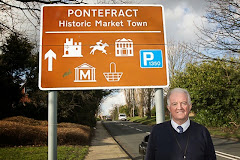Sustainable and appropriate development for Wakefield and the District?
The WMDC Local Development Framework (LDF), came about as a response to a Government Call for local authorities to show a plan to support and deliver the Regional Spatial Strategy (RSS) and its housing and planning elements.
In spring 2006 a team was set up to deliver the LDF and they have been working through a lengthy process to identify locations to be made available for development so that the housing targets of the RSS could be met. Desk surveys have been conducted; different aspects of strategy have been reviewed. There have been a variety of communications made and interested parties have been given the opportunities to make representations and the process has been reviewed at different points by inspectors appointed by various Secretaries of State.
We are now at a point where final recommendations are being made by the most recent Government Inspector that will make the Wakefield Local Development Framework acceptable to Central Government. There are a number of the identified sites which are now attracting interest from potential developers, with developments ranging from hundreds to potentially thousands of houses to be built across the district. Developers are putting in Outline Applications based on the LDF confirming the principle that land is available for development.
As already stated, the LDF was originally developed to deliver Wakefield's requirement to meet the RSS, which was a strategic statement of availability. There has been considerable desk based work done and there is much reliance on general statistical information to support the strategy.
On a number of occasions since 2006 I have asked what specific improvements to infrastructure will be made to facilitate proposals for development and have had no concrete examples, suggestions or proposals. In the council chamber I have asked for reassurances that there will be specific plans to improve infrastructure so as to allow sustainable development in the areas proposed and had general agreement from the Leader of the Council about the importance of infrastructure in sustainable development. The Inspector in her most recent report has commented that "whilst she sees no deal breakers in the LDF" she also wants reassurance and evidence about infrastructural and environmental improvements.
DCLG planning guidance
Central government have struck down the RSS and have simplified national planning policy and guidance, supporting the principle of sustainable development that has community approval. They have upheld the need for Planning Authorities to take account of the viability of sites and locations for developments. They have further upheld the requirement to lead with brownfield locations and a presumption against use of green belt and urban extension.
The issues that face the WMDC Planning Authority with the LDF are that, whilst it releases sites and confirms the principle of development, it does not seem to put forward any significant proposals to improve infrastructure. Taking Pontefract as an example, there are potentially 2000 extra properties being added as “infill” or “urban extension” without significant improvements to the existing road network, schools, GP services, dentists, other health facilities and limited green space or green infrastructure. There has also been a steadfast reluctance to accept the population’s contention that the road network at Town End is over congested. It is only with determined lobbying by local councillors since 2006 that we see proposals to reconfigure the junction to ease capacity and even with that easing process, additional build will quickly return matters to a regular grid lock.
Town End has been the subject of monitoring by WMDC Environmental Health Officers since 2006/7 when it was first identified as an environmental hot spot with pollution exceeding UK safe limits for nox gases and this situation and has identified the location as an Air Quality Management Area which has only got worse with time.
Environmental Health sees potential health problems with the roads leading to the junction. Highways say there is no capacity problem, even though traffic is slow and heavy at busy periods and there can be tailbacks of several miles from the lights if there is a diversion off the A1. Meanwhile, Planning is happily proposing to approve further housing, boosting the population thus adding extra vehicular movement in the area which can only increase congestion and pollution levels. This situation is not unique to Pontefract and there are other locations across the district where similar problems exist.
At various points in the LDF process I have asked Highways Officers to what degree they have been consulted about the proposals set out. Because of its desktop nature there are few examples of consultation on specifics. I have also asked Environmental Health Officers if they have been consulted or supported by Planning or Highways Officers in their attempts to mitigate or address the pollution which is proven to increase hazards to health. There are few examples if any, where specific actions have been proposed.
Action Required
Whilst I accept that a significant amount of time and effort has been put into delivering the LDF and that it gives a basis to move forward in a number of areas, there is a need to re-look at sustainability of development and environmental impact of the LDF in its current form. There should also be opportunities for the newly appointed Director of Public Health to make proposals or representations about measures to mitigate or improve health. There should also be specific measures in place to improve or enhance infrastructure and these need to be instigated prior to giving permissions and releasing land for development.
